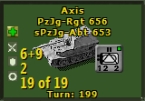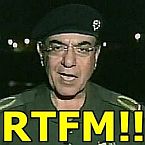vahauser
Posts: 1644
Joined: 10/1/2002
From: Texas
Status: offline

|
quote:
ORIGINAL: MechFO
quote:
ORIGINAL: vahauser
quote:
ORIGINAL: MechFO
As one of the "historicize" fraction I can understand the sentiment, indeed it is true that a large amount of generisation is inevitable given the scope and length of the scenario. However I don't see why one shouldn't also look at history when striving for balance (though balanced in what way, the Germans take Moscow 3 times out of 5?) I f.e. agree with the sentiment that the Germans initially seem overpowered, however one could also look to "historically" weakening the Germans instead of arbitrarily strengthening the Soviets. F.e. the Pz Divs are about 30% overstrength in terms of Infantry and Support Weapon firepower. Now just cutting them down to size would probably go a long way towards (or even overshoot) the objective.
I wish I had a dollar for every time I've had this discussion on the Steel Panthers forum. . .
The unit strengths don't bother me. Why not? Because they are just as messed up on the Soviet side. Don't misunderstand me. My claim is that Norm's original algorithms for calculating the combat value of equipment is seriously flawed. So I don't care what the unit strengths in Directive 21 are, since they are built upon a flawed foundation so it doesn't matter what they are. There are far better ways to adjust the play balance in Directive 21 than fiddling around with units strengths.
I agree the combat model is not perfect and I see your point. However futzing around with TOE's does give the possibility to get the hierarchies right. A "normal" German Inf division will win over a "normal" Russian Division. Divisions with a lot of Infantry but few support weapons will still win sometimes but will suffer much heavier losses (proportionally). A big infantry division with few AT assets will get overrun by even small armoured units etc. etc.etc.
It's not an end to itself, but a useful starting place.
Where the model IMO really breaks down is in how losses are calculated and this is where I agree that historicity becomes virtually useless. What use is sticking to historical production numbers if the loss rates are so far off in TOAW that it's meaningless?
quote:
ORIGINAL: vahauser
Unit proficiencies, supply, movement rates, etc., are all superior ways of adjusting the play balance in Directive 21 (in addition to refining Elmer's programmed responses).
I personally think that only 3 changes would greatly modify the play balance in Directive 21. In order of importance:
#1. Improving Elmer's programmed responses.
#2. Prohibiting human players from voluntarily moving and/or attacking with units in 'Red' supply status.
#3. Doing away with the ant units on the human side (all these divisional HQs and individual regiments, etc.).
Those three changes are the 'Big Three', the way I see it.
I agree, but #1 and 2 is not something the designer can change.
I do see the point in Divisional HQ's with the artillery and some Army level ants are necessary (like for example PzJr) to help create concentrations. The problem with Hex sizes this small is that a lot of artillery will have a range of 2 hexes and more. If these guns are integrated into the units themselves, a lot of supply will go down the drain every time supporting fire is provided (which will be often).
Actually, my point #1 was specifically intended for the scenario designer. What I meant is that the scenario designer can use events and objectives, etc., to materially affect how Elmer is going to respond to a variety of situations. I think that Directive 21's scenario designer is hard at work on this. Which is what I want him to keep right on doing as Priority #1 (and not let himself be distracted by all this quibbling about "historical this" or "historical that").
Point #2 is admittedly a pipedream since human players will abuse and take advantage of the system pretty much whenever they can get away with it.
Point #3 is a HUGE problem worth addressing by the scenario designer. Way back months ago when the playtest of Directive 21 first started and the first threads were formed, I made my position clear regarding allowing the human player to have lots of ants like divisional HQs and panzer regiments. I'm especially opposed to the divisional HQs. Elmer has his divisional artillery organic to his divisions. So should the human player. Further, allowing the human player to stand out of harm's way with his divisional artillery safely behind the front line is a huge advantage for the human. Further, if you want to talk about "historical realism", divisional artillery almost never operated 10km behind the front. Like 99.9% of the time = almost never. The reasons it was called divisional artillery were: 1) it was organic to the division; and 2) it historically operated usually within 5km or so of the front line (i.e., within the same 10km hex as the rest of the division). Further, the divisional artillery always consumed the bulk of its division's supply. Always. So, detaching the divisional artillery into separate units gives the human an enormous supply advantage that absolutely never existed historically.
So, points #1 and #3 are directly under the influence of the scenario designer. Point #2 is a fully justifiable "house rule" that will admittedly probably never be adopted by human players. Oh well. But Points #1 and #3 can and should be implemented. And that is what I mean by not distracting the scenario designer by all the verbiage (a never-ending stream of it) reagarding making things "historical". Ugh.
_____________________________
|
 Printable Version
Printable Version


















 New Messages
New Messages No New Messages
No New Messages Hot Topic w/ New Messages
Hot Topic w/ New Messages Hot Topic w/o New Messages
Hot Topic w/o New Messages Locked w/ New Messages
Locked w/ New Messages Locked w/o New Messages
Locked w/o New Messages Post New Thread
Post New Thread